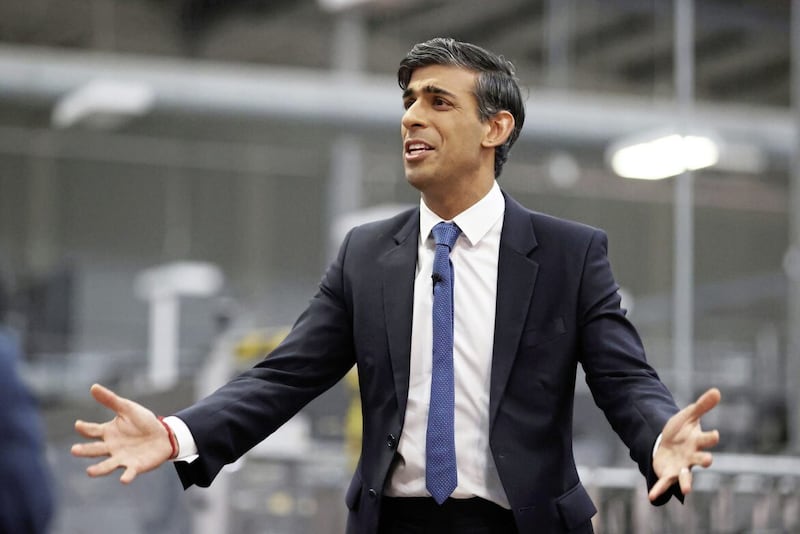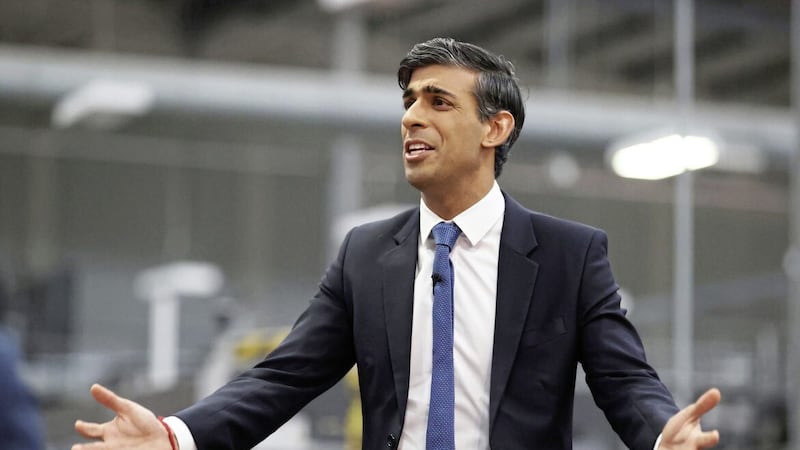WE may have moved from the Northern Ireland Protocol to the Windsor Framework, but what some observers regard as the most positive aspect of the situation remains in place.
As Rishi Sunak put it during his visit last week, the north has "privileged access, not just to the UK home market, which is enormous – fifth biggest in the world – but also the European Union single market. Nobody else has that – no one".
Continuing his sales pitch at the Coca-Cola production facility in Lisburn, the prime minister said: “When I go around the world and talk to businesses, they know that. They are, like, ‘That’s interesting: if you guys get this sorted, then we want to invest in Northern Ireland’, because nowhere else does that exist.”
He went on to deploy his now-famous description of the north as “the world's most exciting economic zone" and pointed out that the Republic of Ireland doesn’t have the same dual access to the UK and EU markets.
Quite a few unionists have, however, been well able to contain their excitement. As far as they are concerned, Northern Ireland’s place within the United Kingdom is still being undermined.
Maybe they should think again. Having privileged access to both the EU and UK markets is undoubtedly beneficial for businesses in the north who take advantage of it. And as the prime minister no doubt accurately stated, other businesses abroad are thinking of investing in Northern Ireland because of that dual access.
Hardline unionists haven't given that aspect a lot of attention, but it could actually have positive results for their cause.
In the event of a border poll where majorities on each side of the Irish border voted for a united Ireland, that dual access would cease. The 32-county republic would be part of the EU single market but not, of course, the UK version. In any referendum campaign, that issue would certainly be raised and could very well ensure that sufficient numbers in the north would vote to retain the status quo. Maybe, therefore, anti-Framework unionists need to rethink their position.
The attention given to the benefits of dual-market access for Northern Ireland has resulted in some observers in Britain suggesting that the whole of the United Kingdom should seek to be in the same position. That would presumably reduce the level of potential investment in the north, but everyone could still expect to benefit. Hardline Brexiteers would no doubt prefer to have the entire UK outside the single market, but they seem to be declining in numbers and influence.

The cross-party advocacy group called Best for Britain, which started out as an anti-Brexit campaign and has developed into an organisation promoting “internationalist values and working with the world”, retweeted a comment from Rishi Sunak on BBC Radio 4’s Today programme where he said: “Northern Ireland has this very special position where it has access to the UK market, has access to the EU market, which makes it an incredibly attractive place to invest for businesses.” The tweet concludes with the rather obvious question for the prime minister: “Isn’t that what the whole of the UK had – and could have again?”
Opinion polls carried out since the beginning of the year show Labour consistently ahead of the Conservatives by margins of 14 to 27 per cent. The next general election must be held by January 24 2025 at the latest, but the prospect of a Tory revival looks rather slim at present. Meanwhile, a list of 34 UK-wide surveys conducted since last May shows that, in every case, those in favour of rejoining the EU outnumber the respondents who wish to stay out. Last July Sir Keir Starmer ruled out a return to the single market or customs union if elected Labour prime minister but, who knows, he might change his mind.
In a television interview on BBC1 last Sunday morning, Secretary of State Chris Heaton-Harris wasn’t asked about any Northern Ireland issues, which may be a reflection of how much is going on in British domestic politics at the moment. However, the north was discussed in an interview the same day with Sky News where he reportedly undertook to give unionists all the clarifications they need on the Windsor Framework.
Meanwhile, a Northern Ireland Office spokesperson is quoted as saying: “We have been clear that we will underpin arrangements in the Windsor Framework through amendments to the Northern Ireland Act 1998 to provide constitutional and democratic guarantees for the people of Northern Ireland.”
We can be certain that any proposed legislative changes will be minutely scrutinised by all the main northern parties. There are interesting times ahead.








